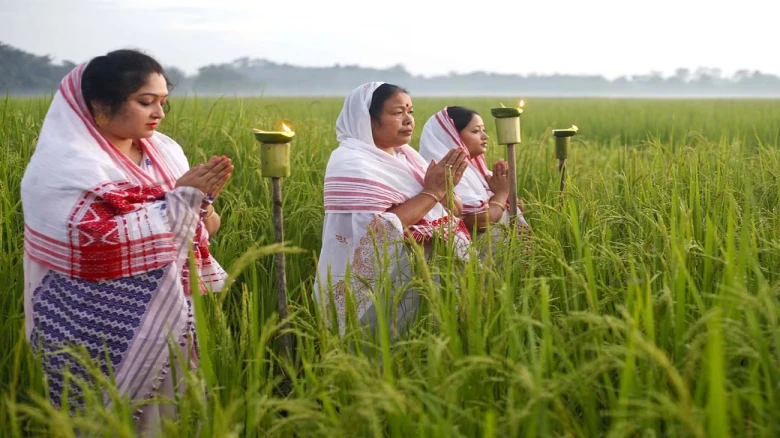This festival signifies the time for relocating rice saplings, an essential agricultural activity in the region...
Digital Desk: Assam is a land of diverse cultures and traditions. Among the many festivals celebrated here, Kati Bihu, also known as Kongali Bihu, holds a special place in the hearts of the Assamese people. This year, Kati Bihu is to be celebrated today, October 18, 2023, with great enthusiasm and fervor.
The name "Kati" is derived from the Assamese word meaning "to cut." This festival signifies the time for relocating rice saplings, an essential agricultural activity in the region. Kati Bihu is one of the three major Bihu festivals in Assam, the others being Bhogali or Magh Bihu observed in January and Rongali or Bohag Bihu celebrated in April. All three Bihu festivals share a common thread: their close association with agriculture.
Kati Bihu, often referred to as Kongali Bihu, conveys a sense of austerity and simplicity. The term "kongali" translates to "poor," signifying a time when the granaries are running low, and food is scarce. Despite these challenges, the Assamese people celebrate this festival with unwavering devotion.
Kati Bihu: Rituals
1. Morning Rituals: The day begins with an early morning bath, a symbol of purity and renewal.
2. Tulsi Worship: Cleaning the house and offering water to the Tulsi plant, also known as Holy Basil, is a crucial part of the celebrations. The Tulsi plant is then placed on an earthen platform called "Tulsi Bheti." Prayers are offered to Goddess Tulsi, seeking the well-being of family members and a bountiful harvest. This worship continues throughout the month of Kati.
3. Lighting of Lamps: Lighting earthen lamps in and around their homes is another essential aspect of Kati Bihu. These lamps illuminate the darkness and are believed to bring warmth and hope during this period of scarcity. Lighting a diya near the Tulsi plant is of particular significance.
4. Akash Banti: People also light a special lamp known as "Akash Banti" or "Sky candle" in their paddy fields. These lamps, fueled by mustard oil, are elevated on bamboo poles and believed to guide the souls of ancestors toward heaven.
Kati Bihu represents the resilience and spirit of the Assamese people, who find solace and joy in the simple rituals that connect them to their land and their ancestors. As Assam prepares to celebrate Kati Bihu in 2023, the festival serves as a reminder of the deep-rooted agricultural traditions and the enduring unity of its people.

Leave A Comment